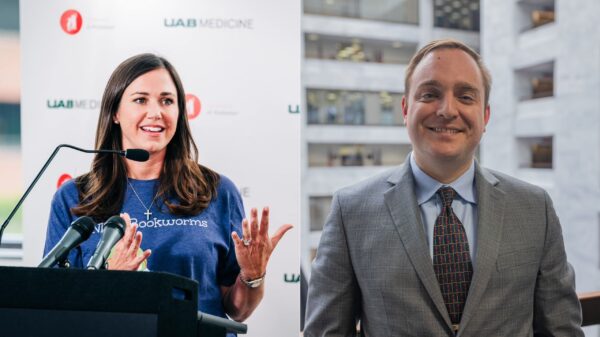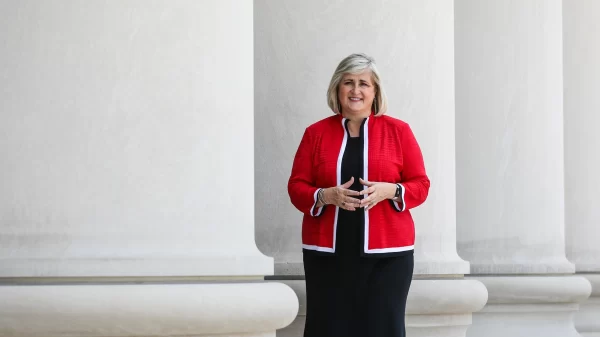|
Getting your Trinity Audio player ready...
|
With the state legislature set to begin its 2025 session this week, lawmakers have emphasized improving Alabama’s mental health coverage as a key issue to address.
Alabama Senate President Pro Tempore nominee Garlan Gudger, R-Cullman, highlighted deficiencies in the state’s mental health care during a Jan. 10 appearance on Alabama Public Television program Capitol Journal.
“You’re gonna see some mental health bills, I believe, and funding for mental health that is gonna be coming up and substance abuse programs,” Gudger said. “There’s not a long-term substance abuse facility in the state of Alabama, which is a shame, you know, and so I want to be able to help with that and bring that to the people of Alabama if they need that because so many people are dealing with that throughout the whole state.”
In 2024, Mental Health America ranked Alabama 39th among the U.S. states and D.C. in terms of overall mental health coverage. The state ranked 46th in quality of access to care, up from 49th in 2015.
The Alabama Department of Mental Health suffered steep cuts in state funding in 2010, leading to downsizing of state psychiatric hospital beds and the closure of psychiatric facilities across the state. State funding for ADMH dropped from $176.3 million in 2009, to $117.2 million in 2010.
State funding for Alabama’s mental health system has been slow to rebound after this recession-era low, with funding surpassing 2009’s peak for the first time in 2020.
One federally funded ADMH program, however, has sought to ease stress on residential psychiatric facilities and the criminal justice system by addressing and correcting symptoms of psychosis at their first appearance in adolescence.
ADMH’s NOVA First Episode Psychosis program is designed to address the first signs of psychosis, which often occurs for the first time in a person’s late teens to mid-twenties, by providing treatment for patients aged 15 to 29 experiencing early psychosis.
FEP offers cognitive behavioral therapy and low dose anti-psychotic medication, as needed. FEP treatment centers provide individual or group outpatient counseling as often as once a week, as well as substance abuse counseling in a group setting offered multiple times a week.
FEP treatment is offered at sites in Huntsville, Cullman, Mobile and Birmingham, ran in partnership with local mental health organizations.
Director of ADMH’S Mental Illness Community Programs Kim Hammack emphasized the importance of treating psychosis patients early and providing educational and employment support to keep them out of long-term treatment or detention facilities.
“You’re trying to divert them from detention facilities, from emergency departments, from long-stay residential,” Hammack said. “If you’re graduating out of high school and you really want to focus on employment, just because you’ve been diagnosed with schizophrenia or schizoaffective, it doesn’t have to end your dreams.”
FEP Programs Mental Health Specialist April Watkins explained that each FEP site employs a supportive employment and education specialist, to assist in providing for patients’ educational and career needs.
“That person spends at least 60 percent of their time out in the community, working with those individuals to either get their GED if they dropped out of high school, to attend college if that’s something that they desire to do, but also to make sure that they have an opportunity to get back into the workforce,” Watkins said.
Hammack explained the NOVA FEP program came about in 2014, from ADMH’s affiliation with the Substance Abuse Mental Health Services Administration, an agency within the U.S. Department of Health and Human Services.
NOVA received its federal funding after a SAMSAH request for a grant which set aside funds for treating adolescents experiencing their first episode of psychosis.
“You had these individuals that they were worried about on the national level that kind of was how do you transition our individuals that’s in our child adolescent world into our adult world,” Hammack said.
Before NOVA, Hammack explained, Alabama’s adult and child mental health care systems lacked programs that dealt with the unique challenges of adolescent psychosis care.
“The adult system is more used to dealing with the psychosis, but they’re not used to dealing with the fact that you still may be in school and education,” Hammack said.
When planning the program, Hammack explained, ADMH looked at the two national “standards of excellence” for first episode psychosis care: the Early Assessment and Support Alliance out of Oregon and OnTrackNY, an early psychosis program out of upstate New York.
ADMH ultimately decided on EASA as the model for NOVA FEP’s programming, with Hammack saying, “We looked at which one was more similar to Alabama and similar to our concept and how we deliver services.”
“We looked at where our data was of individuals between the age of 15 and 25, and where did they live?” Hammack said. “Of course, you’re going to see that more in your more metropolitan, urban-type areas, and so the planning council had wanted us to focus on approaching JBS Mental Health Authority, who covers that Birmingham area, and Alta-Pointe, who cover the Mobile area, and then added on Wellstone, which covers that Huntsville area.”
According to Hammack, during the 2024 fiscal year, NOVA FEP treated a total of 281 individuals.
Hammack emphasized the difficulties of providing first episode psychosis treatment in rural areas, but said the program is taking steps to flesh out its rural coverage alongside other ADMH initiatives.
Alabama’s more urban counties are “where you’re gonna have the population that can support that kind of comprehensive first episode psychosis team,” Hammack said.
The FEP program requires the participation of a comprehensive team made up of a psychiatrist, nurse, team leader, case manager and education and employment specialist.
The program also provides a youth peer specialist who has had experience with early psychosis to counsel patients, as well as a parent peer with experience living with a child with early psychosis.
Hammack said providing a workforce capable of providing for NOVA’s patients has been a consistent barrier to expanding care into rural areas.
“Really those who do this and do this well are folks who don’t mind working non-traditional hours, and they don’t mind going to someone’s home,” Hammack said.
NOVA FEP is piloting a program where it’s Mobile team has been expanding into Washington County, according to Hammack.
“We also want people to realize, because you may not have a FEP team in your area, it doesn’t mean you don’t have access to a team of some sort in your area,” Hammack said.
ADMH currently operates five crisis centers across Alabama, which are operated in partnership with local mental health organizations. Hammack said that, while FEP teams are not tied to crisis centers, the two rely on one another to ensure patients receive adequate training.
“They may have what’s called a child and adolescent in-home team or an adult in-home team or what we call an ACT team—that’s an assertive community team,” Hammack continued, saying, “If you don’t have an FEP team in your area, please find out what you do have, because every center has some type of team whether it’s adolescent or adult.”
Hammack also highlighted the ADMH’s Connect Alabama app as a valuable resource for those looking for mental health care services in the state. The app provides information on substance abuse and mental health treatment as well as a service locator and a list of available helplines.
Crisis centers in the state include: AltaPointe Behavioral Health Crisis Center in Mobile, WellStone Emergency Services in Huntsville, Carastar Health Crisis Center in Montgomery, Craig Crisis Care Center operated by JBS Mental Health Authority in Birmingham and Hope Pointe operated by Indian Rivers Behavioral Health in Tuscaloosa.
ADMH is also currently in the process of constructing the SpectraCare Crisis Center in partnership with SpectraCare Health systems in Dothan. The crisis center is expected to begin operations this month.
The state also offers the 988 hotline and mobile crisis services. 988 is the national hotline number for any mental health, substance abuse or suicide related crisis.
According to ADMH, mobile crisis services are offered for Alabamians without easy access to a crisis center. The state operates 14 mobile crisis teams across 11 community health centers to help treat mental health crises face by residents of Alabama’s 55 rural counties.
However, according to Hammack and Watkins, the stigma around mental health and getting services at a mental health center remains another barrier to mental health access in the state.
“A very important part of the FEP program is to make sure that they’re giving outreach,” Watkins said, continuing, “They’re going to those schools; they’re going to the churches and to the hospitals and to the physician offices just so we can erase those barriers to access.”
Hammack also explained ADMH is also currently looking at ways to incorporate possible sources of funding from the state as well as its federal grant saying, “There’s work being done to expand that so that you can start blending some funding.”














































